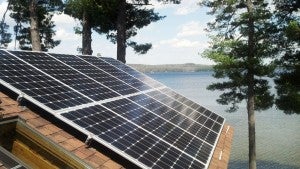 By: Roger Stephenson, EDF’s Senior Advisor for New Hampshire Affairs
By: Roger Stephenson, EDF’s Senior Advisor for New Hampshire Affairs
New Hampshire’s solar industry has an opportunity to stand as an example of the economic gains and consumer savings that are possible when lawmakers reach across the aisle.
But the state’s public utilities commission must act quickly and responsibly.
Earlier this year, Republican and Democrat state lawmakers reached across the aisle to move forward on clean energy “net metering” legislation allowing the solar industry to continue growing in the state. (As many readers of this blog know, net metering is a policy that allows solar-equipped businesses and homes to sell their unused solar energy back to the grid.)
As it has in many other states, the solar industry in New Hampshire has seen tremendous growth in recent years. There are more than 73 solar related companies in New Hampshire, employing about 770 people. Last year, more than $45 million was invested in solar installation in the Granite State. But also, like other states, New Hampshire remained handcuffed by policies that stacked the deck in favor of legacy utilities and kept solar energy from truly taking off.
In April, a broad cross section of New Hampshire leaders came together to remove the shackles. Getting to this point required a lot of work among leaders in the legislature and clean energy advocates, as well as negotiations with the utilities and solar installers. Environmental Defense Fund, NH Sustainable Energy Association, the state Nature Conservancy chapter, and other environmental stakeholders were at the table.
The decision reached doubles the statewide net metering program cap, from 50 MW to 100 MW. In other words, the total amount of solar energy residential and commercial customers could sell back to the grid in New Hampshire had doubled.
[Tweet “New Hampshire Just Doubled Its Solar Net Metering Cap – And It Already Needs More”]
But now, just weeks after the bill was signed, solar providers are already nearing the increased net metering cap for larger solar projects, at least in the Eversource service area (Eversource serves about 70 percent of electricity customers in New Hampshire). While the bill signed into law is unquestionably a big step in the right direction, a problem many stakeholders foresaw in the negotiations is being realized: New Hampshire solar needs a cap higher than 100MW.
New Hampshire’s legislature did their part by lifting the cap on an interim basis. Now the cap is being considered by the New Hampshire Public Utilities Commission, and it is up to them to use the regulatory process to ensure net metering provides a reasonable, reliable, and consistent clean energy choice for businesses and residents. The Commission now has ten months to complete its work, but in the interim, solar in New Hampshire is once again hitting an artificially low ceiling.
New Hampshire solar needs a cap higher than 100MW.
The Granite State has a lot to be proud of, especially compared to some other states. In Nevada and Arizona, the old utilities are pushing for rules that would run the solar industry out of town. In Florida, outdated policies side with big utilities and limit the opportunity for businesses and homeowners to go solar.
In New Hampshire, at least, lawmakers, clean energy advocates, and solar installers are embracing a robust, clean energy future with strong economic growth and savings for all who want them. Now it’s up to the Public Utilities Commission to move the state a step closer to this reality.
Photo credit: Fred Greenhalgh/Flickr









